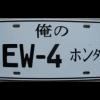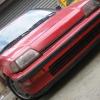My general rules for upgrading brakes on "street driven" cars is to; upgrade the master cylinder to the size that was originally used by Honda for the car that used the front calipers. which in this case is 15/16inch.
Sometimes the booster requires upgrading due to the size of the master cylinder upgrade so I will use the smallest booster possible to help pedal feel.
I have used this method for a long time and have upgraded countless brake systems in this way, pedal feel is always good in the cars I have upgraded, plenty of stopping power no problems with rear brake bias so long as the correct proportioning valve is used for the rear brake type.
Scott I would suggest you at least upgrade to the 7/8inch 1985 Prelude master cylinder which is just one size down from the 15/16inch master and its a bolt in swap to the stock booster.
To wade into the debate about aftermarket multi-piston calipers IMO the biggest gain is caliper rigidity and reduction of unsprung weight, all alloy calipers and multi piece rotors are very light, one recent upgrade I am working on upgrading from stock 282x21mm brakes to 300x28mm adds almost 10kg per side of unsprung weight.
 Sign In
Sign In Create Account
Create Account





 Back to top
Back to top
 View Garage
View Garage









